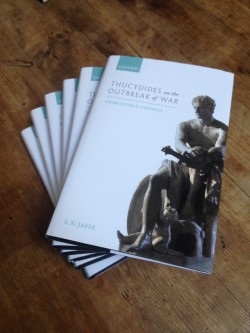ASCSA Alumnus Combines Political Science and Classics

Seth Jaffe opens his first book by explaining its contradictions: “This book is the work of a political scientist (a political theorist), but is my sincere hope that it will prove of interest to classicists, from whom I have learned so much about Thucydides and this world.”
The book, now available in Europe, is called Thucydides on the Outbreak of War: Character and Contest. In it Jaffe, an Assistant Professor of Political Science and International Affairs at John Cabot University in Rome, conducts a political psychological study of Thucydides' first book of The History of the Peloponnesian War. Jaffe looks at the political arguments the Greek historian makes and how exactly he makes them. “My guiding thematic question in looking at Thucydides’ account of the origins of the war is how an author would attempt to communicate something of universal significance through the specifics and particulars of the outbreak of the Peloponnesian War.”
Jaffe wrote large parts of the original manuscript as an associate member at the American School of Classical Studies at Athens (ASCSA) from 2008-2010 and still other parts of it at the ASCSA in the summers of 2013 and 2014. As a political scientist with a background in international relations, his specialty is not that of the typical ASCSA member. But the study of Thucydides is not simply a Classical Studies pursuit: “Thucydides is often appropriated as the first international relations theorist.” said Jaffe. He states classicists often focus on Thucydides’ historical moment and context, while political scientists often look at his supposed theories. “But," he argues, "the political thought of Thucydides proves bound up with his distinctive understanding of the interrelationship of particular events and universal themes.”
Jaffe hopes his work will be an intervention between political science and classics, a contextualization of both the universal themes and the particular histories of the text. “I asked how Thucydides addressed both in his own work. I work to articulate a 5th century author’s view without trying to argue it is correct. […]My reading looks at the internal, progressive logic of the first book of the History.”
In his research, Jaffe worked to adhere to the standards of classical philology, reading the text in original Greek and studying the diction. He traced out every usage of the word ananke (necessity) in Book One because Thucydides famously writes that the war was necessary in a way. “Then I tracked the use of all necessity words because I believe they create a coherent political psychological account. This is the best case I can make,” he explained. “Even if someone disagrees with me I hope to be a part of the wider scholarly conversation about Thucydides and his world. I very much tried to engage Classics secondary literature as well as speaking to my own disciplines of political theory and international relations.”
Jaffe argues that Thucydides understood history as a pure truth: “I think he did not see his own mind as the organizing feature but rather that his mind was (somehow) open to the themes which could be revealed through the particulars of the Peloponnesian War. He doesn’t understand history as a making but rather as a finding or seeing what is essential through the war and then creating a mimetic understanding of that war for the vicarious education of his future readers.” He hopes this understanding of Thucydides’s mindset and psychology can explain the logic of the book, and give context for the theories modern readers pull from it.
The environment and resources at the American school provided rich fodder for Jaffe’s political psychological study: “It was such a rewarding circumstance to be surrounded by classical historians, epigraphers, and philologists. That was a kind of interdisciplinary education I never would have gotten in a simply political science framework,” he said. “If the book thing has good things in it, they are largely the product of my time with the American School Community."
Jaffe’s greatest hopes are that the book will enter the discussions already being had about Thucydides: “I do think I have differences with classicists on this or on that issue but I really hope to have interdisciplinary conversations with people and I try to make the book a serious understanding of that,” concluded Jaffe. “I want to be a conversation partner with Classicists and I think there are many ways we can enrich the broader scholarly conversation about ancient thinkers.”